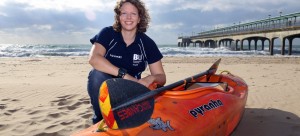 It’s British Science Week 2017 and to celebrate we’re sharing some of our science research stories, to highlight some of the fantastic research taking place here at BU. Today we’re looking how we’re breaking down the barriers in kayaking for women.Kayaking originated as a method of hunting on rough seas for Arctic Inuit tribes. It was later popularised in the UK by Scottish sportsman John MacGregor, known as Rob Roy, who wrote about his many voyages in a canoe more than 150 years ago, before his death in Bournemouth in 1892.The sport has, ever since, exhibited a more male-dominated history, with only 18% of UK kayakers being female in 2013, according to figures from Sport England.An early career researcher at BU is researching the design of kayaks, focussing on understanding how anthropometric enhancements, such as seating height within the craft, can affect the performance and paddling efficiency of white-water kayaks for women. Shelley Ellis, an academic and Lecturer in Biomechanics and Performance Analysis, became interested in the subject as she saw the challenges facing women in kayaking first-hand.
It’s British Science Week 2017 and to celebrate we’re sharing some of our science research stories, to highlight some of the fantastic research taking place here at BU. Today we’re looking how we’re breaking down the barriers in kayaking for women.Kayaking originated as a method of hunting on rough seas for Arctic Inuit tribes. It was later popularised in the UK by Scottish sportsman John MacGregor, known as Rob Roy, who wrote about his many voyages in a canoe more than 150 years ago, before his death in Bournemouth in 1892.The sport has, ever since, exhibited a more male-dominated history, with only 18% of UK kayakers being female in 2013, according to figures from Sport England.An early career researcher at BU is researching the design of kayaks, focussing on understanding how anthropometric enhancements, such as seating height within the craft, can affect the performance and paddling efficiency of white-water kayaks for women. Shelley Ellis, an academic and Lecturer in Biomechanics and Performance Analysis, became interested in the subject as she saw the challenges facing women in kayaking first-hand.
“My research looks specifically at kayak sitting height – it’s about trying to identify whether adapting sitting height in a white-water kayak can make our paddle strokes more efficient. It’s really borne out of my personal background as a kayaker and the challenges I’ve faced,” explains Shelley.
Having been around the kayaking community for some time, Shelley had heard many coaches suggest that seating height should be raised in order to improve performance, but discovered that there was no follow-up guidance about how much to raise the seat by. It tends to be based on trial and error, rather than taking into account an athlete’s height, body shape and size.
“Because historically kayaks have been predominantly designed with male participants in mind and we can’t change that or make the kayak different at this point in time, we have to make what we have more accessible to all users,” says Shelley, “We already know that by altering sitting height it will effect a chain of contact points within the kayak, however we don’t know how high it has to be to improve efficiency overall.”
Women tend to have a shorter torso length and shorter arms, which gives them a smaller lever to paddle the boat through water. If the sitting height is changed, then this means women have a different torso height, enabling them to have better leverage when paddling.
“My research is all about making sport, in this instance kayaking, more accessible to female participants. The number of women taking part in kayaking is considerably lower than men, although the female population in kayaking is growing much faster than males.
“It’s really about breaking down those barriers on the basis that equipment wasn’t originally designed for women – sport should be accessible for everyone and can be with our scientific knowledge. If we’re able to say that based on height and arm span, for example, we are able to calculate an altered seat height to enable a kayaker to be more efficient, this can help them to progress to the next level of their sport.
“If you look back to the Olympic and Paralympic Games, there are many names of female athletes that come to mind, from Jessica Ennis-Hill and Laura Trott to Sarah Storey and Ellie Simmonds, these now well-known names are helping to change perceptions of what is and isn’t achievable. But these successes didn’t happen by accident – alongside incredible athletes, a lot of science and research has taken place and this has also helped to understand how equipment should be setup for each athlete.
With these role models, even more people are likely to get involved in sport. As all of kayaking’s history has come from a male background, what we now need is for manufacturers to catch up to the fact that it is becoming more popular for women.
“We’re very lucky in the way that we think at BU – we’ve got a lot of academics here who feel that research is important but are also keen to make it relevant and useful. We want to make sure that our research will be used by people and through engaging people with that process, we can ensure that it has a further reach in the long run.
“I’m supported by a local kayaking business, South Coast Canoes, who give me access to participants and a place to share my research directly with the kayaking population in the form of workshops and talks. It really motivates me to solve this ‘challenge’ that female kayakers face as there are people telling me that this research is important, and that they need the answers to move forward in the sport.”
This story featured in the 2017 Bournemouth Research Chronicle, which can be read in full here.
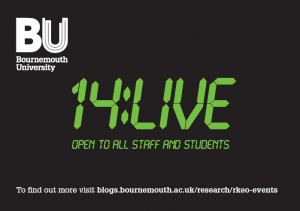






 Share your research over a pint!
Share your research over a pint!

 Message from Vitae:
Message from Vitae: Further to the earlier
Further to the earlier 

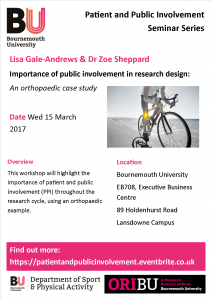
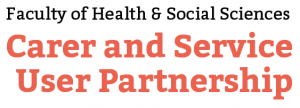
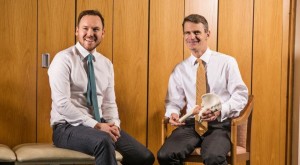
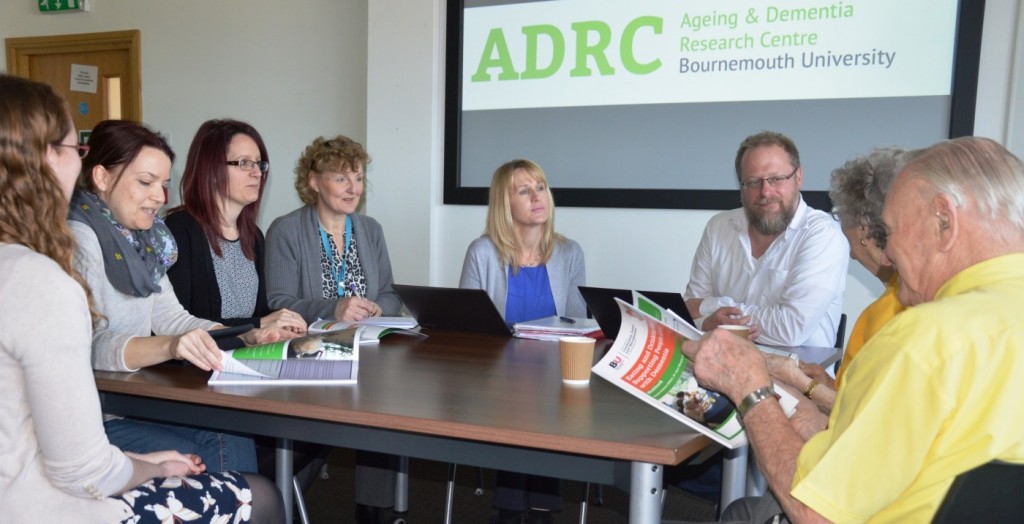











 REF Code of Practice consultation is open!
REF Code of Practice consultation is open! BU Leads AI-Driven Work Package in EU Horizon SUSHEAS Project
BU Leads AI-Driven Work Package in EU Horizon SUSHEAS Project Evidence Synthesis Centre open at Kathmandu University
Evidence Synthesis Centre open at Kathmandu University Expand Your Impact: Collaboration and Networking Workshops for Researchers
Expand Your Impact: Collaboration and Networking Workshops for Researchers ECR Funding Open Call: Research Culture & Community Grant – Apply now
ECR Funding Open Call: Research Culture & Community Grant – Apply now ECR Funding Open Call: Research Culture & Community Grant – Application Deadline Friday 12 December
ECR Funding Open Call: Research Culture & Community Grant – Application Deadline Friday 12 December MSCA Postdoctoral Fellowships 2025 Call
MSCA Postdoctoral Fellowships 2025 Call ERC Advanced Grant 2025 Webinar
ERC Advanced Grant 2025 Webinar Update on UKRO services
Update on UKRO services European research project exploring use of ‘virtual twins’ to better manage metabolic associated fatty liver disease
European research project exploring use of ‘virtual twins’ to better manage metabolic associated fatty liver disease